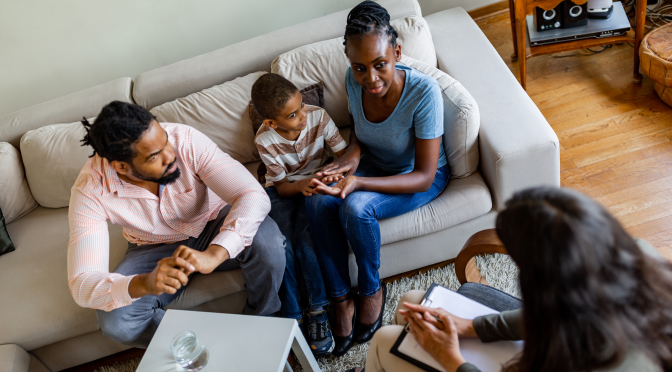What to Expect When Admitting Your Child for Mental Health Residential Treatment

If you or someone in your care is experiencing thoughts of suicide or self-harm, call the Suicide and Crisis Lifeline at 988 or chat live at 988lifeline.org.
Admission to a mental health residential treatment program can be an emotional but necessary decision for parents or caregivers who are concerned about a child. Most often, someone receiving this level of treatment needs professional help with severe depression, anxiety, suicidal thoughts, self-harm, the impacts of trauma, disruptive or dangerous behaviors, or other mental health needs.
Read this blog to understand what to expect when admitting a child for this level of care, how to begin the admission process, and how KVC Missouri can support a child and their family from the point of first contact through the discharge process.
What Brings a Family to the Point of Needing Residential Treatment?
Despite a caregiver’s best efforts, a child may reach a point where residential mental health treatment becomes necessary. As difficult as it may be, residential treatment can be transformational. Many factors bring a child and family into this situation, including trauma, severe mental health conditions, self-harm, substance use disorder, chronic behavioral issues, difficult life situations, and other reasons.
It’s essential to consider what outpatient resources have been engaged to try to help a child. Strong and Connected can be a helpful place for some people to start on their treatment journey, along with Intensive In-home Services, Intensive Outpatient Programs, Intensive Care Coordination, Psychological Services and other community services.
Regardless of why a child needs help, it’s important to advocate for the appropriate care. If community resources have not helped the child experience improvement and there is a safety concern, it could be time to consider residential treatment.
“By the time caregivers are considering residential treatment, families have usually exhausted all other resources within the community,” explains Cheryl Constable, Senior Clinical Director with KVC Niles.
What is Residential Treatment Designed to Help With?
Residential mental health treatment is designed for those who pose a safety risk to themselves and/or those around them and need support with emotional or behavioral regulation.
To this end, residential treatment can help with a range of mental health challenges. It provides a plan of action to reach goals for better mental wellness. “We work together with the children and families to help the child learn to make decisions on their own outside of treatment,” Alicia says. The ultimate goal of residential treatment is to help the child move beyond crisis. We’re laying the groundwork for them to be safe with themselves and their family. Following their treatment, they’re able to utilize other community resources to continue their healing.

How to Get Started with Residential Treatment
If someone is interested in residential treatment from KVC Missouri, the first step is to call our team at (844) 424-3577 or complete this form.
A member of our highly trained team will talk with you about the child’s challenges to help guide you on the best next steps to help meet their needs. A child must be approved for admission into one of our residential programs and will be evaluated to ensure they will benefit from this level of treatment. A child can also be referred by a healthcare provider or another agency serving children and families. Getting a referral can help keep your child connected to existing healthcare services. Referrals provide important healthcare information to help the residential program with the evaluation process.
Before Treatment Begins
When it is time for a child to be admitted, a caregiver(s) will bring the child to the residential treatment facility. Upon arrival, a KVC team member will greet them and begin the welcoming process to make them feel comfortable and show the caring and supportive environment they are entering. “I do my best to meet the youth at their level and individualize the intake process to each child,” explains Holly Varner, Case Manager at KVC.
While Receiving Residential Care
Residential treatment provides a therapeutic and supportive environment with 24-hour supervision where youth can receive intensive interventions, gain coping skills, and work toward improved mental health and wellbeing. Our facilities have state-of-the-art security and monitoring systems and our team members are highly trained in crisis intervention.
How will the client spend their days? One of the initial focuses of treatment is stabilization to ensure safety which includes conducting comprehensive evaluations and assessments to determine treatment goals. Based on individual needs our team will create treatment plans, offer evidence-based therapies, and provide skill-building and educational opportunities and support. We also focus on building family support and involvement and preventing relapse through aftercare planning.
Master-level therapists provide individual, group and family therapy on a weekly basis. A client’s therapist acts as the central point of contact for their family, external stakeholders such as outpatient providers, and their KVC treatment team. If required by diagnosis, a client will receive substance use education. Outdoor experiential learning is also an important part of our therapeutic services.
Each adolescent receives similar but differing approaches based on their needs.
Timeline for Treatment

We understand that residential treatment is a big decision and that it is very difficult for a child to be separated from their family. The treatment timeline is different for every child based on their diagnoses, individual needs and treatment goals. Once a child is admitted and evaluations are conducted, their treatment team will develop a plan. Typical timelines range from 30 days to six months, depending on how each child processes through the program and the kinds of resources needed.
Residential Treatment: What Caregivers Should Know
When a child is facing a crisis that requires residential treatment, we understand that caregivers will have many questions. Here are answers to a few of the questions we most commonly receive:
- What resources do you have for families? KVC provides an abundance of resources for caregivers and families. We believe family involvement in a child’s treatment is a key element to a child’s improvement so we do all that we can to help strengthen the family connection including offering family therapy. We also have several online resources providing mental health education and our treatment team is always available to provide support to our client’s families.
- Will the child be safe? Yes! Our team members are highly trained, very detailed, and observant of each child’s daily behaviors and overall wellbeing. Our team ensures that medications are taken properly (when prescribed), ongoing evaluations are conducted and doctors are available if needed. We utilize state-of-the-art security and monitoring to ensure clients are safe throughout the common spaces of our facilities.
- Can the child continue their education while in residential care? Yes! Each child in our care will either attend an accredited KVC Academy onsite or will attend school in the community.
- What will be expected of parents/caregivers? It’s important for a child to know that they are supported. Caregivers are encouraged to engage with a child throughout the course of their treatment, attend family therapy every week, and help the child practice new coping skills. KVC offers Family Passes on the weekend and families can attend treatment team meetings each month.
- What type of security does a KVC treatment center have? Front entrances are securely locked and all visitors must be let in by front desk personnel. We require identification to enter. A child’s legal guardian must approve any visitors and callers, maintaining safety for children and employees. No visitors, including caregivers, are allowed in treatment areas or client bedrooms to ensure the safety, privacy and confidentiality of all clients and employees.
Why Choose KVC?
What sets KVC apart from similar treatment programs? Holly brings up the longevity and care of the staff. “Our team has seen all types of behaviors and are able to identify and handle the situations that come with children in their care,” she says.
Beyond that, all staff working at KVC receive training in trauma-informed care. This ensures that the children receive effective care that acknowledges their life experiences to improve youth engagement. “Even the kitchen staff is trained in trauma-informed care,” Alicia adds.
KVC strives to find creative ways to meet the needs of clients, their families and employees. Surveys are given to each client’s guardian after they are discharged with the hope that ongoing improvement can be made for future adolescents. With a family-focused atmosphere, the goal is successful reunification and healthy relationships.
At KVC, we know that if a parent or caregiver is considering mental health residential treatment for their child or teen, they’re experiencing heartbreaking difficulties. While admitting the child to residential treatment is a challenging decision, it can also represent a turning point and a new season full of hope for the family. KVC can help. Learn more about our residential services and start the conversation today.





